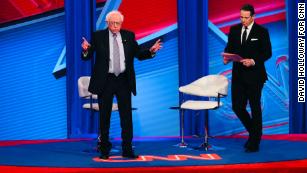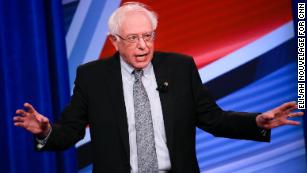Smoking With Cigarettes
Superstar
ButtiBuddies must've been takenMan we got cats in here calling themselves #ButtiBoys
ButtiBuddies must've been takenMan we got cats in here calling themselves #ButtiBoys



Elizabeth Warren is the star who may eclipse Bernie Sanders
By Jess McIntosh
Updated 11:41 AM ET, Tue April 23, 2019

Jess McIntosh is a Democratic strategist and former communications adviser for Hillary Clinton. She is also the editor at large of Shareblue Media and co-host of the SiriusXM radio show Signal Boost. The opinions expressed in this commentary are solely those of the author. View more opinions on CNN.
(CNN)In 2016, some Democrats might have been more excited about electing the first woman president if Elizabeth Warren had been running. In 2019, they have a hell of a choice ahead of them.

Jess McIntosh
Warren has been the breakout policy star of the cycle so far, announcing audacious, thoughtful, and transformative proposals almost every week. In her CNN town hall Monday night, she eclipsed the seasoned progressive to whom she is often compared. While Bernie Sanders, whose town hall came directly after Warren's, made his traditional arguments in classic Bernie style, Warren proved that she will give him a run for his money.
Just hours before her town hall, Warren rolled out a higher-education overhaul that would forgive student debt, open public universities tuition-free, and dedicate $50 billion to historically black colleges and universities (HBCUs). It drove the conversation throughout the day, reminding us there can be a time after Trump when we focus on rebuilding the public trust and prioritizing the American people.
Perhaps unsurprisingly, Warren has been plagued by breathless opinion pieces wondering whether she was likable enough, lamenting her lack of charisma, or clucking over whether her obvious intellectual heft would be off-putting to alienated voters.

Bernie Sanders lays out his vision for 'Medicare for All' 01:16
But to watch Warren take the stage is to wonder what candidate these concerns apply to, because it most certainly isn't this one. She was excited, bounding onto the stage, asking to get closer to the students and joking about keeping an eye on the ones in the back. Her energy was brimming over, she bounced on the balls of her feet, moved throughout the space and passionately explained that she would not "get Hillary'd."
It was three minutes in when she first talked about racial discrimination unprompted, discussing raising Pell grants and funding HBCUs to help address racial economic injustice for students of color. After a plug for science, her answer on legalizing marijuana focused on disparate sentencing for black men and women. She deftly answered a question about protecting police that was asked by a white man aspiring to be a cop by calling out the issue of racial injustice at the heart of our criminal justice system -- because no one is safe when we have a broken system.
We got a reprise of the "You didn't build that" speech that first made Warren famous -- the one in which she called out self-made wealth for using publicly funded resources as an argument for the wealthy giving back to society. But this time it was contextualized in the conversation we're having now in 2019 -- one we're having largely because Warren made us, announcing right out of the gate her plan to impose a millionaires tax that would dramatically reorder the economy. She explained that plan Monday night, simply and with enthusiasm: two cents from every qualifying dollar would net us universal child care and pre-K, tuition-free college, and student debt forgiveness, with a trillion dollars left over to keep fixing stuff. It was wonky, and it was exciting.

Sanders says the right to vote should be extended 'even for terrible people' like Boston Marathon bomber
Warren was strong on the Green New Deal and on impeachment, positions which excite the progressive wing of the Democratic party. And she showed her mastery of a progressive tenet that continues to evade Bernie Sanders: racial injustice is a foundational driver of economic inequality.
In contrast, for much of his hour, Sanders stayed firmly in his wheelhouse, where he continues to be one of the strongest progressive communicators. He was back to his disheveled classic self at the CNN town hall, after an alarmingly tidily groomed turn at Fox News. He started on familiar ground by laying out our dismal health care stats, from high premiums to high infant mortality rates, and he clearly articulated the urgent need for Medicare for All.
But when he was asked directly about reparations and ending the wealth gap for black people, he cited South Carolina Sen. Jim Clyburn's 10-20-30 plan to put federal funds into all high-poverty-risk communities. It was a plan belonging to someone else, that assumes the racial wealth gap for black people is located exclusively in high poverty-rate communities. It was an obvious misstep on what should be his strongest ground: systemic economic injustice.

Student asks Bernie Sanders about 'failures of socialism' 04:17
In some way Sanders is the victim of his own success; the conversation has moved foundationally around income inequality, largely to his credit. We hear about our economy being rigged to benefit billionaires and corporations from every candidate running. Today it sounds less inspiring and more, well, obvious. And if it's divorced from a discussion of racial or gender discrimination, it feels not nearly urgent or effective enough.
Compared with Warren's detailed agenda to partly reorder the economy to correct the imbalance against women, workers, and racial minorities, Sanders risks sounding like he's providing a recitation of idealistic generalities that most of us already understand and share.
His bluntness served him well when he could turn it on something he disagreed with, like the "right-wing, dare I say racist" administration of Israeli Prime Minister Benjamin Netanyahu. And he refused to compromise the principal belief that voting is a right for every American when a student asked him about restoring voting rights to convicted terrorists and sex offenders who are currently serving time.
Stay up to date...
Sign up for our new newsletter.
Join us on Twitter and Facebook
But on climate change, free college, and taxes, where Warren answered with specific policy, Sanders answered with sweeping morals.
It's something those voters who supported him in 2016, but wished she'd been in the race, are going to pay attention to. Asked about Warren's education reform proposal, he said, "Elizabeth and I end up agreeing on a whole lot of issues." That isn't going to be lost on voters, either.
Opinion | Why not Warren?
By Jennifer Rubin
7-9 minutes
Jennifer Rubin
Opinion writer covering politics and policy, foreign and domestic
The most progressive wing of the Democratic Party is represented by two candidates: One is younger than President Trump, cheerful, doesn’t have the “socialist” label and has a zillion policy ideas. The other is five years older than Trump, prickly and humorless, has the socialist label and embraces the most extreme positions many in his party reject (e.g. allowing incarcerated mass murderers to vote). So far — to my ongoing amazement — Democratic primary voters tell pollsters they want the grouchy socialist, Sen. Bernie Sanders (I-Vt.), not Sen. Elizabeth Warren (D-Mass.), the cheerful policy wonk who declares she’s a capitalist, albeit one who recognizes that the system is “rigged."
We should remember that early polling might simply reflect Sanders’s name recognition, but nevertheless, it is not as if Warren is an unknown quantity. By virtually any measure, she’s a more accomplished and more electable choice, yet it’s Sanders who remains in the top tier of candidates. As Warren showed Monday night at a CNN town hall, she’s obviously the candidate with the most detailed, specific policies — and the one most capable of explaining detailed plans. She also manages to be less frightening — but bolder — than Sanders.
As to boldness, Sanders swore off pushing impeachment hearings now. Warren gave this impassioned plea:
Three things just totally jump off the page. The first is that a hostile foreign government attacked our 2016 election in order to help Donald Trump. The evidence is just there. Read it, footnote after footnote, page after page documentation.
Part two, Donald Trump welcomed that help. ...
Part three is when the federal government starts to investigate part one and part two, Donald Trump took repeated steps aggressively to try to halt the investigation, derail the investigation, push the investigation somewhere else, but otherwise keep that investigation from going forward and turning into a serious investigation about a hostile foreign government that it attacked us and about his own personal interests.
So, here’s how I see this: If any other human being in this country had done what’s documented in the Mueller report, they would be arrested and put in jail. Obstruction of justice is a serious crime in this country. But [special counsel Robert S. Mueller III] believed because of the directions from Donald Trump’s Justice Department that he could not bring a criminal indictment against a sitting president. I think he’s wrong on that, but that’s what he believed. So he serves the whole thing up to the United States Congress and says, in effect, if there’s going to be any accountability, that accountability has to come from the Congress. And the tool that we are given for that accountability is the impeachment process.
This is not about politics. This is about principle.
Whatever you think of impeachment, that’s as good an answer as a candidate can give to a Democratic audience. It helps, of course, that she has actually read the whole thing (“if you’ve actually read the Mueller report, it’s all laid out there. It’s not like it’s going to take a long time to figure this out. It’s there. It’s got the footnotes. It’s got the points. It connects directly to the law”). With specifics she is able to make her case quite compelling: “He told the White House counsel to go fire Mueller, and then told the White House counsel to go lie about having told the White House counsel to go fire Mueller, and then told the White House counsel to write a letter saying that Donald Trump had not told him to go fire Mueller, and then to say, ‘Why on Earth would you take notes about what I said to you? The lawyers I deal with never put anything in writing.’” When she puts it that way, it’s hard to see how Sanders or other more cautious Democrats will explain their reticence.
During a campaign stop on April 20, Sen. Elizabeth Warren (D-Mass.) said the Mueller report shows that President Trump should be impeached. (Reuters)
Specificity is an asset in the policy realm as well. Warren has a fleshed-out plan and has a way to pay for it. “What we have to do as a country is roll back that debt. And so, I have two parts to the proposal,” she said. “Part one is that we say that we’re going to roll back student loan debt for about 95 percent of students who have debt.” She continued, "And part two is to make sure that we never get in this mess again on student loan debt and that is to make college universally available with free tuition and fees, and to put more money into Pell grants so that students of color, so that our poorest students have real access to college and that we put real money into our historically black colleges and universities. " She’s explicit about how to pay for it, without demonizing the rich:
I started several months ago about a wealth tax, an ultra millionaire's tax. It's 2 cents on every dollar of the great fortunes above $50 million. So, your 50 millionth and first dollar, you've got to pay 2 cents and 2 cents on all of the dollars after that.
And here’s the stunning part. If we ask the great fortunes in this country, understand, this isn’t about trying to be nasty or say you’ve done anything wrong, what it’s about is saying, look, you had a great idea. You got out there. You worked hard or you inherited well, whichever one it was. ...
And we say, good for you, that you have now gotten this great fortune, but 2 cents. You've got to pay something back so everybody else gets a chance.
And here’s how the money works out. If we put that 2 cent wealth tax in place on the 75,000 largest fortunes in this country, 2 cents, we can do universal child care for every baby zero to 5, universal pre-K, universal college and knock back the student loan debt burden for 95 percent of our students and still have nearly a trillion dollars left over.
Why, then, is Sanders high in the polls and Warren struggling? Somehow Sanders has convinced himself and a lot of Democrats that a socialist pushing 80 years old who wants to let incarcerated mass murderers vote is more electable. Seriously, Democrats? If you want the candidate farthest to the left who won’t be clobbered by alienated voters who elected moderates in 2018, you’d better look elsewhere — that is, if you actually want to win the White House.
i think it makes sense to forgive everyone's debt OVER a number, say 15 grand. or 10 grand, or whatever. of course no one should pay 100 grand in student loan debt, but your ass should pay somethingHe’s smart in the sense of getting the task at hand done. The question is what he prioritizes. He cannot be anyone’s VP except maybe Biden. America is not voting for any combination of a person of color, woman or democratic socialist AND a gay dude. Warren won this debate BTW. Still think her cut off for forgiving debt should not be as rigid. It penalizes married couples and negates things like people who don’t come from anything and have to support family. I think forgiving 50000 to everyone wholesale makes more sense.




